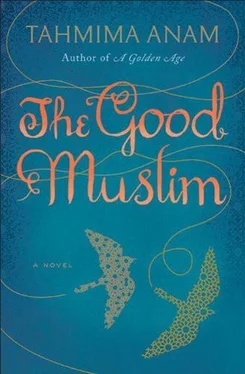‘Yes, I heard. I–I thought of calling him, but—’
‘He doesn’t have a phone.’ They began to walk towards the university. Maya resisted the urge to make Joy recall what her brother had been like, in the battlefield, at war, as a student revolutionary, to share the tragedy of his transformation. ‘Tell me about New York. How tall are the buildings, really?’
‘Taller than in the films.’
‘Taller than that? You must have felt very small.’
‘It isn’t the buildings that make you feel small.’
‘What did you do?’
‘I was a taxi-driver,’ he said. He looked at her and she gave him a small smile, as if to say it was all right his driving a taxi, there was no shame in it. ‘And I got married.’
‘Married!’ She stopped in her tracks. ‘Unforgiveable. You get married and you don’t tell anyone?’
They had reached the giant banyan tree in front of the Art College, under which they had passed so many afternoons before the war. He pressed a palm against it and leaned back. ‘It wasn’t that kind of marriage.’
‘What, then?’ She thought about it for a moment, the answer came to her, and before she knew it she had blurted out, ‘Pregnant?’
He laughed. ‘Maya-bee. Stings like a bee. Like Muhammad Ali.’
That was the nickname. Maya-bee.
He went on. ‘I married her so I could stay in the country. My student visa ran out and I didn’t want to come back.’
‘So attached to foreign,’ she said.
‘I know how you feel about it — you made it very clear the last time we saw each other.’ He pulled a box out of his pocket and held it up to her.
‘A cigarette from New York? I can’t refuse.’
He put two cigarettes in his mouth, lit both and passed one to her.
‘I saw that in a movie once,’ she said.
‘Me too.’
‘I thought you didn’t like the cinema.’ She was reminding him of the soldier he had been, the one who was worried about appearing soft.
‘I’m not the same man any more.’
‘I don’t believe it.’
He changed the subject. ‘But they tell me you haven’t changed a bit. Still the same fighting spirit.’
She blushed, suddenly shy. She told him about Rajshahi, about becoming a village doctor, omitting the cause of her sudden departure. And she pictured him crying, the way he had lifted his hand to his face. She wanted to say something to him about his brother. Aref had been Sohail’s best friend at university, the two inseparable once Sohail discovered that Aref’s father, like Ammoo, was Urdu-speaking, that they both had relatives in Pakistan. It had set them apart from the others, having to square their politics with their family history.
She was still holding her shoes. When she bent down to slip them on she saw that he too was barefoot, his trousers rolled up. ‘Where are your shoes?’
‘I left them at home.’
‘In New York?’
They both laughed. He hailed a rickshaw, holding out his hand to help her to her seat, and just as she was about to wave goodbye he slipped in beside her. ‘I’d like to see Sohail,’ he said.
She wondered how much he knew — and if she should tell him about the upstairs, and all the visitors, and the sight of their clothes, hanging thick and black on the washing line, and how years ago they had thrown away all their light bulbs, their darkness now interrupted only occasionally by the tiny yellow presence of oil lamps.
‘Now’s not a good time,’ she said. ‘He’s out of town.’
He lowered himself out of the rickshaw. ‘Another day,’ he said, nodding his head to her as if he were wearing a cap. Then he said: ‘There’s a party next Friday at Chottu and Saima’s. Why don’t you come?’
She had heard of Chottu and Saima’s wealth, their big house in Gulshan. She was a little curious. And, she thought, she wouldn’t mind knowing when she would see Joy again. ‘Maybe. I’ll phone you, okay?’
On her way home, Maya recalled the last time she had seen Joy. Sheikh Mujib had been released from jail in Pakistan and was arriving in Dhaka that morning. People were lining up along the streets all the way from the airport to Road 32 in Dhanmondi, where he lived. Maya met Chottu and Saima on Mirpur Road. Chottu had painted a green-and-red flag on his cheek. She told him he looked like a clown. ‘I don’t care,’ he said. ‘Joy Bangla!’ By then the crowds were streaming in from all sides, pouring out of houses, shops, abandoning their cars, jumping out of rickshaws. Children were pulled up on shoulders. When she looked back, the road had disappeared behind her, replaced by a swell of bodies. Finally they came to the street where Mujib would be passing and staked out a place on the footpath. The singing grew louder. ‘He’s coming,’ Chottu said, standing on his toes. ‘I can see him.’
A roar travelled up the road. Mujib was standing in the open top of a very ordinary cab, one of those trucks that are used to carry bricks or crates of fruit. Tajuddin stood on one side, Sheikh Moni on the other. The cab was strewn with flowers. As it went by, Mujib was looking the other way, and she could see only the back of him, his coat, his white kurta. The convoy must have been moving rather slowly, but to Maya it sailed past, and she fell into its wake, swimming into the crowd. She locked arms with Saima and they inched ahead. By now they could see the backs of all those men who had finally returned from war, the people who would make their victory into a country, who would write the constitution and give them passports and anthems.
Maya felt someone tugging at her sari; she tried to speed up and pressed into the person in front. Saima’s arm slipped out of hers as she pushed ahead. Then there was a tap on her shoulder. She turned around, irritated, and saw a man reaching through the crowd, a laugh in his eyes. She stopped. He stopped. They stood still and looked at each other, people flowing around and between them, like stones in a river. She reached for his hand, the one nearest to her, but he offered her the other, and it turned into a handshake. ‘Hello, Joy,’ she said stupidly.
‘Maya-bee.’ Stings like a bee, he used to say. It was impossible to stay in this position, against the tide, so she turned around and continued to walk. She felt him following. Occasionally they were jostled, and she could feel him crashing lightly into her. She began to hum a revolutionary song, and she heard him pick up the tune. Moved, she reached again for his hand.
Then she found it, the gap where his finger should have been. Hand swaddled by a thick bandage. Slowly, she moved the tip of her finger over what was now the tip of his finger, the bandage stretched tight and smooth. She turned around again, releasing his hand, and stared into his face. ‘Where is your finger?’ she asked.
‘Army took it.’
She reached for it again, the crowd impatient at her back, and brought the interrupted finger to her lips. ‘Goodbye, finger,’ she said.
‘Goodbye, Maya,’ Joy replied, ‘I’m going away.’
‘Misunderstanding,’ she said, We’ll have to give your finger a proper burial.’
‘I’m going to America.’
Impossible. She jerked herself away. ‘Now, you’re going now?’
‘Day-after-tomorrow.’
It came back to her, the crudeness of his character. How he had bullied and cursed his way through the war. Looted a cinema hall for the projector, still rotting in her mother’s garden shed. She clung to this evidence of his criminality. ‘Goodbye, then,’ she said. ‘Good luck.’ And she reached out to shake his hand,’ the uncut one, as if to say, go on, you broken thing, I have no need of you.
Now, Maya counted Joy’s losses and stacked them up against her own. He had lost his brother in the fighting, and then, after being captured by the army, he had come home to find his father gone. She was comforted by the nearness of this man, this man who had survived far worse than she.
Читать дальше












